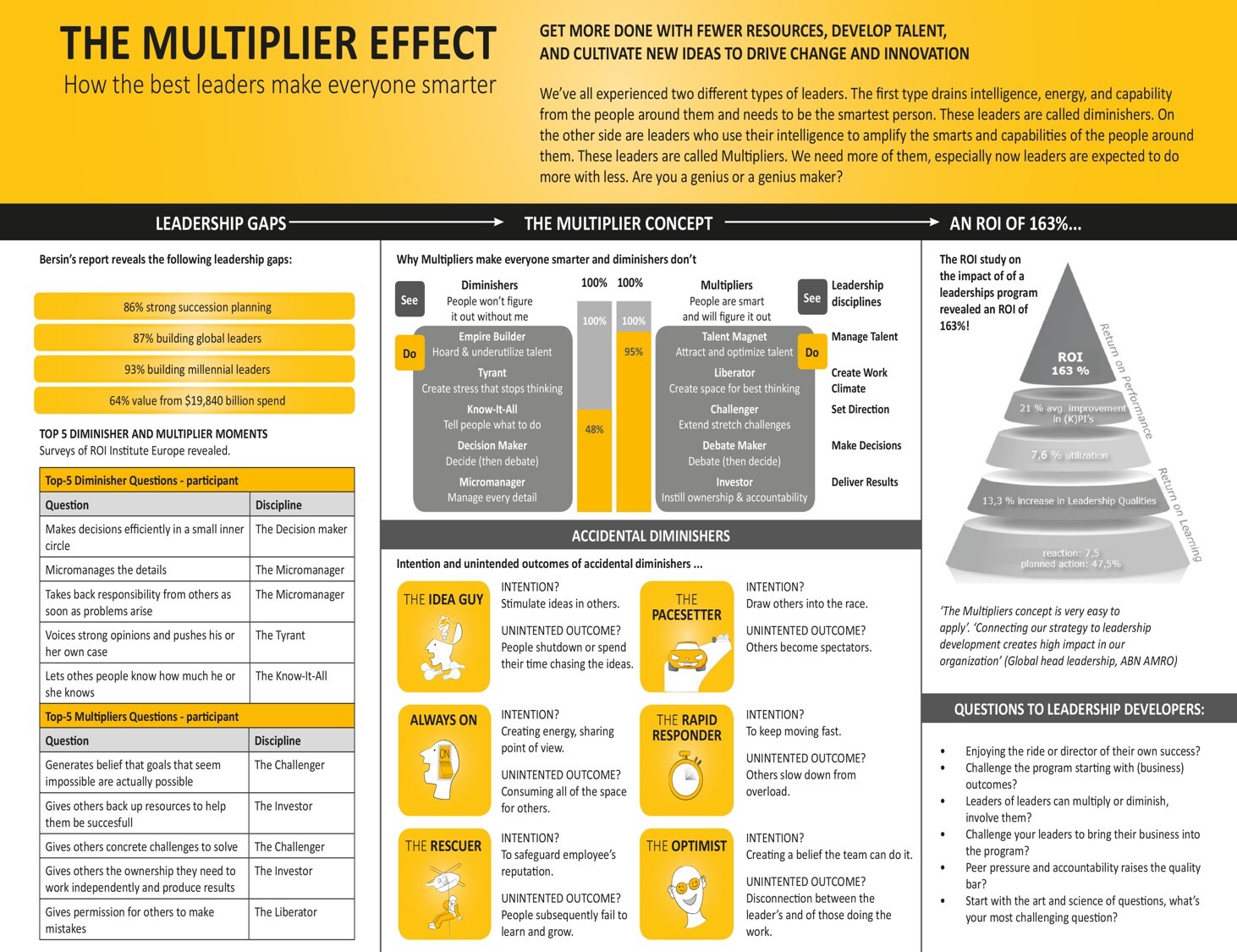Multipliers
The Multiplier
- They increase the intelligence and achievements of their team.
- Help everyone on his team shine and be the best they could be
Types
Talent Magnet
Someone who has the ability to bring together an outstanding team
4 key practices of a talent magnet
- look everywhere for talent, regardless of traditional boundaries or hierarchies. If someone is skilled, they are valuable
- ascertain an individual’s instinctive skill - something they can do very naturally, without even thinking about it
- engage that skill where it’s best suited - knows which roles will perfectly suit which talent
- remove the obstacles that stand in the way of your team performing at its maximum effectiveness
3 steps to become a talent magnet
- identify the specific way your teammates are smart, and let them and the rest of the team know
- put teammates in a position that allows their talent to shine
- once someone’s hit their limit, don’t keep them tied down
- If a teammate has reached the ceiling in their current position, it’s your duty to let them go so they may continue to grow elsewhere
Liberator
Creates a high-pressure atmosphere in which people want to rise up and do their very best work in an effort to make something great.
3 Key practices of a liberator
-
gives people room to work - take a step back and allow your team to do its job, rather than constantly offering your own input
- give space by offering fewer opinions .. when you do, make sure they’re received as suggestions and not orders
-
asks for a team’s best work, without fearing failure
- encourages experimentation. As long as his teams do the best work possible, he never punishes them for a bad outcome
- makes sure the team knows that they can make mistakes, so long as they learn from them
Challenger
Always aiming high.
3 Key practices of a challenger
- point people in a specific direction, where they can develop their own ideas (and avoid telling someone where to go or what to do)
-
help your team define challenges
- Challengers ask questions and pose challenges to people so that they may set the appropriate goals
-
inspire belief in the possibility of reaching the goals
- by showing the team that it’s within reach and pointing them in the right direction
Debate Maker
3 Key practices of a Debate maker
- carefully prepare the issues to be debated so that they can be clearly presented to the staff
-
spark an engaging and thorough debate that offers a wide variety of voices and opinions
- make it clear that both agreements and disagreements were welcome
-
make sure that a strong decision is reached in the end
- a decision has to be made by the leadership or through delegation in a way that makes the outcome clear to everyone
3 Main techniques for leading a good debate
- only ask questions and never give answers
- every answer must be supported by evidence
- every participant must give answers
Investor
3 Key practices of an investor
- clearly define the ownership stake your team members have
- everyone on your team knows exactly what they are in charge of and responsible for. By giving workers a sense of ownership, you’ll soon see a motivating feeling of personal investment emerge.
- make sure those with responsibilities have the resources they need to succeed
- ensure responsible people are held accountable for their responsibilities
Fast track practices to be coming a Multiplier
- focusing on one skill that you can maximize and one weakness that you can neutralize
- maximize your Challenger by setting ambitious goals, and minimize your Tyrant tendencies by giving your team more room to breathe
- challenge your assumptions
The Diminisher
Have a diminishing effect on the capability and productivity of their underlings. Micromanage their teams to the point that they become wholly dependent on leadership.
Behavior
- sap both intelligence and energy out of their employees
- focused more on their own intelligence than they are on taking advantage of the potential smarts within their team.
- tend to stifle ideas
Types
Tyrant
Likes to create a tense atmosphere by throwing their weight around and pointing out everyone’s mistakes
Voices strong opinion and pushes own case.
Decision maker
Bring up issues, seemingly at random, while forcing their own decisions upon the team and ignoring other opinions
Accidental diminisher
- too much assistance by providing a constant flow of instructions and feedback
- optimist - undermining the genuine difficulty of a project
Reflection exercises
- ask for regular feedback from a trusted source
- asked participants to turn to the person next to them and share one way in which they might be (accidentally) diminishing others
Dealing with Diminishers
Effective strategies
- regroup and figure out what the problem is and how you might make a suggestion that could defuse the conflict
-
remind your boss that you’re qualified to work without constant oversight
- invite them to see your talent firsthand
- be your own Multiplier and use the key practices on your boss
The five least effective strategies
confrontation, avoidance, quitting, lying low and ignoring

Notes mentioning this note
Discovery of core values
<!DOCTYPE html PUBLIC “-//W3C//DTD HTML 4.0 Transitional//EN” “http://www.w3.org/TR/REC-html40/loose.dtd”>
Discovery of Core Values
Moc teams
<!DOCTYPE html PUBLIC “-//W3C//DTD HTML 4.0 Transitional//EN” “http://www.w3.org/TR/REC-html40/loose.dtd”>
MOC Teams